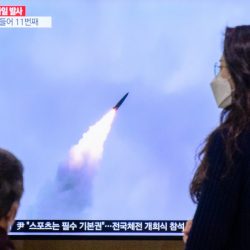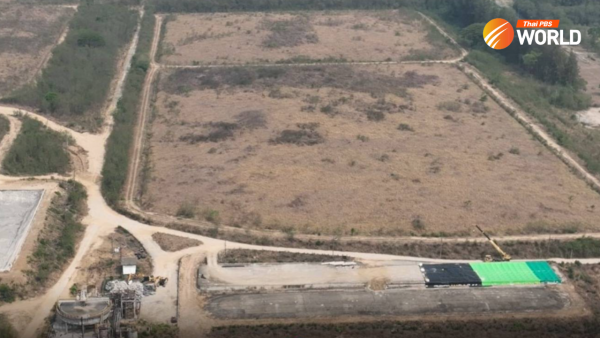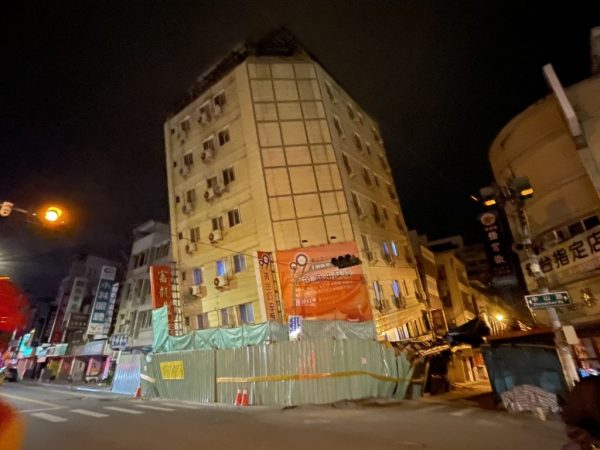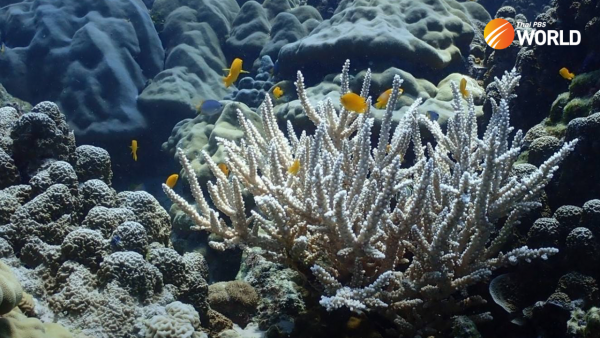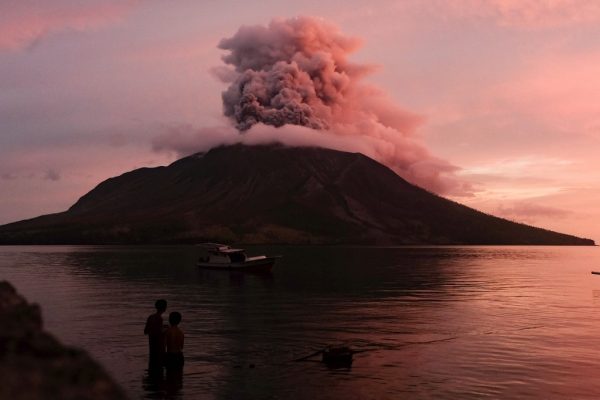‘Over my dead body’: The locals fighting a 20-year battle against Udon Thani potash mine plan

Worried about her hometown, 75-year-old Manee Boonrod is flying a green flag at her home to signal that she will keep fighting to protect the environment and the health of local residents.
“If you want to mine, do it in your area, not ours,” said Manee, a leading force behind the Udon Thani Environment Conservation Group.
For over 20 years, she has waged a battle against a plan to operate a huge potash mine across five subdistricts of Udon Thani’s Muang and Prachak Sinlapakom districts.
“Our hometown has always been a pleasant place to live. But we can’t be sure what will happen if mining operations start here,” she said.
Planned potash mine
Asia Pacific Potash Corporation (APPC) – in which Italian-Thai Development Plc has a 90-percent stake to the Finance Ministry’s 10 percent – has won the license to operate the potash mine over 26,446 rai in Udon Thani. Most of this land currently belongs to locals. Under the license, APPC is allowed to extract potash on condition that mining operations are at least 100 meters under the surface.
The 25-year license is effective from September 23 this year. During the first three years, APPC will focus on the construction needed to mine the potash. It expects to produce up to 2 million tons of potash fertilizer each year over the next 21 years. Under the terms of the license, it must then spend a year or two to rehabilitate the natural landscape around the mine following its shutdown.
The location of APPC’s mine was chosen after studies revealed this area of Udon Thani is rich in potash.
“Once the mine opens, it will significantly reduce Thailand’s dependence on potash imports,” government deputy spokeswoman Ratchada Thanadirek said.
Currently, Thailand imports 800,000 tons of potash each year, mainly for fertilizer production. The cost of importation is between 7.6 billion and 10 billion baht annually. The price of potash has soared since sanctions were imposed on potash-producing Russia as a penalty for invading Ukraine in February.
APPC says its mine will cut Thailand’s potash imports by 7 billion baht and allow the country to export 18 billion baht of the raw material each year. It adds that the government will receive over 29.5 billion baht in revenue from the mine during its lifetime.
Questionable operation
Locals say it is suspicious that the government granted APPC the license, even though a dispute over its planned operation is still before the Supreme Administrative Court.
“We can’t believe that authorities have ignored our two-decade fight,” said Pikulthong Totuyo, a key member of the Udon Thani Environment Conservation Group.
On May 9, 2013, her group lodged a complaint with the Udon Thani Administrative Court to intervene over a report on land-rights documents to be used in support of the planned potash mine.
In 2018, the court ruled in the group’s favor on grounds that the report was illegitimately prepared. Both the Department of Primary Industries and Mines and the Udon Thani Industry Office were instructed to review APPC’s request for a mining license based on the Minerals Act BE 2560, which was introduced in 2017. The appeal lodged by APPC is still being reviewed by the Supreme Administrative Court.
“We have not fought this fight alone,” Pikulthong said. “Local youths have joined our battle, as have environmentalists from across Thailand.”

Health and environmental impact
Pikulthong said the locals were most worried about the potential health and environmental impacts from the planned potash mine. For generations, residents here have worked on farmland and enjoyed good yields. Though they are not rich, they are happy with their way of life.
“What if the mine causes land subsidence, air pollution, and infertile soil?” she asked.
The concerns are not groundless, she added, given the damage caused by Thailand’s first potash mine, which is located in Nakhon Ratchasima’s Dan Khun Thod district. Operated by Thai Kali Co Ltd, the Dan Khun Thod mine has been producing 100,000 tons of potash per year after gaining a license in 2015.
“We have already witnessed land subsidence in Dan Khun Thod,” Pikulthong said. “Mining operations will result in things that we can’t control.”
Production at the country’s second potash mine, operated by ASEAN Potash Chaiyaphum Plc, has not yet started.
APPC, which is set to open Thailand’s third potash mine, has already produced an environmental impact assessment (EIA). However, Udon Thani Environment Conservation Group insists that the EIA was improperly prepared, with the group’s advisor Suwit Kularbwong saying locals were excluded from the assessment process.
“Whenever we raise this point, authorities simply reply that this or that step has already been completed,” he complained.
If authorities are to push ahead with the APPC potash mine, he added, they should at least provide assurances that its operations will be safe and fair to locals.
“If you say you have measures in the EIA to minimize environmental impacts, you must implement them tangibly for us to see,” Suwit said.
According to authorities, APPC will ensure that its mining operations do not endanger the structure of the soil, thus preventing land subsidence. Built structures in the area therefore will not be affected. Moreover, the EIA contains measures to handle salt, dust, and salinity in the area too.
The APPC’s strategic environmental assessment claims that 63 percent of direct stakeholders agree with the development of a potash mine in their hometown, with conditions. The conditions include proper environmental protection, compensation for affected people, and the allocation of some mine income for local community development.
Also, only 100 out of 2,000 people who attended public forums on the potash project disagreed with the plans.
However, Suwit said the public forums were usually held inside military camps and away from people who lived close to the site of the planned mine.
APPC community-relations chief Sompoch Wongkathum argued that only a few families were against the mining project and his team was reaching out to explain the benefits they would receive.
“Also, we will set up 11 funds for communities and the environment. These funds will provide over 3.5 billion baht for community and environmental care during the course of the project,” he said.
Unknown future
The Udon Thani Environment Conservation Group intends to fight against the APPC mine to the very end, with petitions submitted to various authorities including the Udon Thani governor.
“I can’t tell whether the potash mine will finally materialize here,” Manee said. “But I can tell you that we will fight to our death.”
By Thai PBS World

